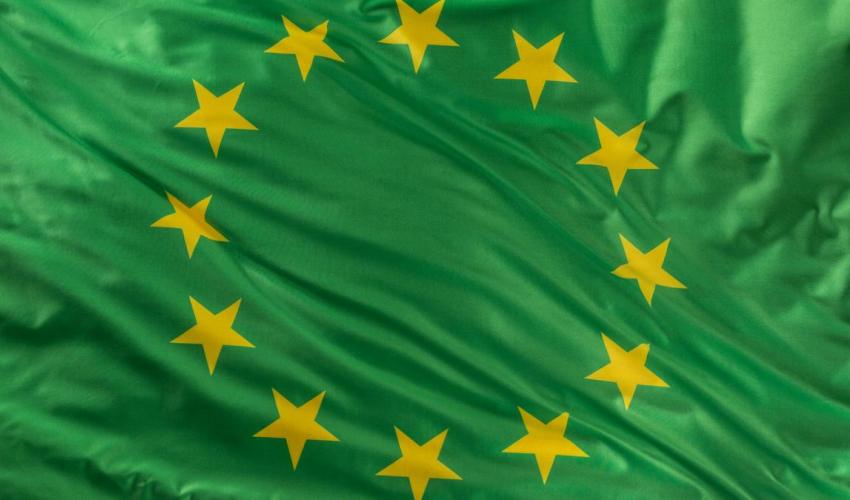
Autoras: Beatriz Oste Bazilio e Gabriela Oste Bazilio
O Green Deal Europeu é um plano da União Europeia que objetiva tornar as economias do bloco mais sustentáveis. Para isso, os países transformarão os desafios climáticos e ambientais em oportunidades de serem mais eficientes em termos de recursos e agregar competitividade. Segundo a Comissão Europeia, os pilares do plano incluem: eliminar a emissão de gases de efeito estufa até 2050, dissociar o crescimento econômico da exploração de recursos e em nenhuma circunstância deixar para trás os países e sua população na progressão de suas ações.
Para atingir os objetivos propostos pelo plano, a União Europeia irá disponibilizar € 1 trilhão ao longo da próxima década, segundo o The Guardian (2020). Uma parte do dinheiro para este seria disponibilizado pela própria União Europeia, uma parte pelos governos nacionais e a quantia restante deverá vir do setor privado, posto que a proposta do acordo é que as empresas sejam estimuladas a fazerem investimentos verdes[1] de risco por meio de uma garantia de empréstimo do Banco Europeu de Investimento.
Neste processo, uma grande quantidade de empresas europeias será afetada pelas modificações estruturais necessárias para que os países pertencentes à UE alcancem as metas estabelecidas pelo Green Deal, como a alteração dos padrões de energia e transporte. Segundo o Center for Sustainability and Excellence, os pequenos e médios empresários poderão ter que cumprir critérios mais rigorosos de sustentabilidade, sendo imprescindível a mudança do modelo de negócio para que continuem existindo neste novo formato econômico.
No segundo semestre de 2020, os líderes empresariais de mais de 30 companhias globais divulgaram uma declaração de apoio ao Green Deal Europeu, reconhecendo o seu valor como estratégia de crescimento sustentável. Empresas, incluindo a Nestlé e a Unilever, estão comprometidas a reduzir sua pegada de carbono e a adotar novos modelos de trabalho e produção.
Conclui-se que o acordo é ambicioso por propor reduzir totalmente a emissão de carbono no bloco europeu sem impacto no crescimento econômico enquanto melhora a qualidade de vida da população, sendo necessário reformular a maioria dos principais aspectos da economia. Todavia, é uma grande oportunidade para a Europa liderar a transição mundial para uma nova era sustentável.
Referências Bibliográficas
HARVEY, Fiona; RANKIN, Jennifer. What is the European Green Deal and will it really cost €1tn?. The Guardian, 2020. Disponível em: <https://www.theguardian.com/world/2020/mar/09/what-is-the-european-green-deal-and-will-it-really-cost-1tn>. Acesso em: 16 out. 2020.
A European Green Deal: striving to be the first climate-neutral continent. European Commission. Disponível em: <https://ec.europa.eu/info/strategy/priorities-2019-2024/european-green-deal_en>. Acesso em: 16 out. 2020.
DUŠEK, Mirek. Business leaders embrace Europe’s new green reality for investment and growth. World Economic Forum, 2020. Disponível em: <https://www.weforum.org/agenda/2020/09/business-leaders-embrace-europe-s-new-green-reality-for-investment-and-growth/>. Acesso em: 16 out. 2020.
ASKEW, Katy. Nestlé, Unilever, Royal DSM back economic “reset” under UE Green Deal. Food Navigator. Disponível em: <https://www.foodnavigator.com/Article/2020/09/16/Nestle-Unilever-Royal-DSM-back-economic-reset-under-EU-Green-Deal#>. Acesso em: 16 out. 2020.
How will Green Deal affect corporations in EU?. Center for Sustainability and Excellence, 2020. Disponível em: <https://cse-net.org/how-will-green-deal-affect-corporations-in-eu/>. Acesso em: 16 out. 2020.
O que são os investimentos verdes?. Netinbag. Disponível em: <https://www.netinbag.com/pt/finance/what-are-green-investments.html>. Acesso em: 17 out. 2020.
[1] Investimentos verdes: são empreendimentos financeiros, realizados através de ações ou fundos de investimento, em empresas responsáveis ambientalmente com intuito de promover uma economia verde e maximizar a lucratividade para os investidores.
O Núcleo de Estudos e Negócios Europeus (NENE) está ligado ao Centro Brasileiro de Estudos de Negócios Internacionais & Diplomacia Corporativa (CBENI) da ESPM-SP. Foi criado considerando a necessidade de estimular a comunidade acadêmica brasileira e latino-americana a compreender melhor suas relações com os europeus, buscando compreender e aprofundar a Parceria Estratégica Brasil – União Europeia.
